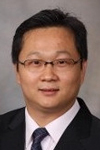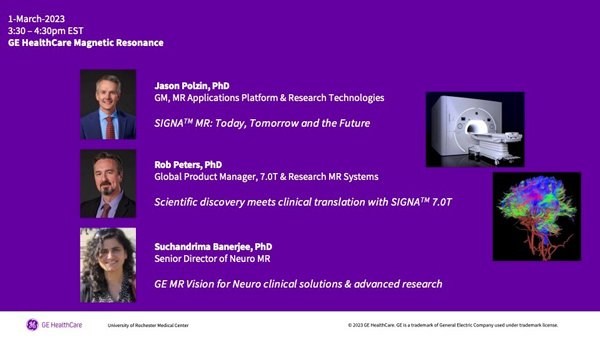Events
UR CABIN Users meeting
“Goal-directed action in the human brain”
CABIN Users meeting: "Using structural MRI to track stroke-induced retrograde degeneration”
Berkeley Fahrenthold, PhD; Krystal Huxlin, PhD - Professor, Flaum Eye Institute, Center for Visual Sciences; Postdoctoral Fellow, Huxlin lab
Feb 20, 2023 @ 1:00 p.m.
Meeting ID: 933 7900 1288
Passcode: 773538
Zoom linkLinking macro-, meso-, and microscopic brain dynamics on cognition and behavior by multimodal imaging integration
Shinho Cho, PhD - Research Associate, University of Minnesota Medical School
Center for Magnetic Resonance Research and Departments of Radiology
Feb 28, 2023 @ 4:00 p.m.
 Dr. Cho’s research aims to delineate the dynamic interaction and casual relationship between macro-, meso-, and microscopic-scale functional brain activity that underlies cognition, behavior, and clinical symptoms. He will present the functional relationship between the activity of subcortical brain regions and large-scale brain networks. Simultaneous deep brain stimulation and functional MRI (fMRI) in human and animal brains reveal that neuromodulation on deep brain structure (e.g., nucleus accumbens) altered not only the whole-brain network connectivity but influenced patients' cognition (e.g., mood). The following topic will illuminate the mesoscopic cortical layer and columnar organization that subserves visual orientation encoding in cats' primary visual cortex. The 9.4 Tesla fMRI and multiphoton optical imaging reveal the cortical layer-dependent orientation tuning property of hemodynamics response, reflected by vessel dilation and constriction. Dr. Cho will discuss the multimodal imaging (e.g., PET-MR) that bridges the gap of the dynamics between neurotransmitters (e.g., dopamine) and macroscopic brain networks; how the deficiency of neurotransmitters would impact brain and behaviors systematically. Overall, these findings and the integrated approach of different imaging modalities, behavioral assessment, and neuromodulation can characterize causal and correlational relationships in the hierarchical brain, providing a unique opportunity to understand the biological basis of cognition/behavior and neurologic/psychiatric disorders.
Dr. Cho’s research aims to delineate the dynamic interaction and casual relationship between macro-, meso-, and microscopic-scale functional brain activity that underlies cognition, behavior, and clinical symptoms. He will present the functional relationship between the activity of subcortical brain regions and large-scale brain networks. Simultaneous deep brain stimulation and functional MRI (fMRI) in human and animal brains reveal that neuromodulation on deep brain structure (e.g., nucleus accumbens) altered not only the whole-brain network connectivity but influenced patients' cognition (e.g., mood). The following topic will illuminate the mesoscopic cortical layer and columnar organization that subserves visual orientation encoding in cats' primary visual cortex. The 9.4 Tesla fMRI and multiphoton optical imaging reveal the cortical layer-dependent orientation tuning property of hemodynamics response, reflected by vessel dilation and constriction. Dr. Cho will discuss the multimodal imaging (e.g., PET-MR) that bridges the gap of the dynamics between neurotransmitters (e.g., dopamine) and macroscopic brain networks; how the deficiency of neurotransmitters would impact brain and behaviors systematically. Overall, these findings and the integrated approach of different imaging modalities, behavioral assessment, and neuromodulation can characterize causal and correlational relationships in the hierarchical brain, providing a unique opportunity to understand the biological basis of cognition/behavior and neurologic/psychiatric disorders.
Medical Center | Upper Auditorium (3-7619)
Host: University of Rochester School of Medicine and Dentistry, Department of Neuroscience, and the Del Monte Institute for Neuroscience
Neuro capabilities of the GE 7 Tesla Human MRI
Mar 01, 2023 @ 3:30 p.m.
Please join us March 1st, 3:30-4:30pm for a zoom presentation by General Electric, to learn about the Neuro capabilities of the 7 Tesla Human MRI.

Zoom Link
UR CABIN Diffusion MRI workshop, Session 3
Mar 10, 2023 @ 1:30 p.m.
In previous workshops, we reviewed theory (Day 1), preprocessing, and DTI (Day 2). We will review constrained spherical deconvolution (CSD) and tractography in the upcoming workshop. Time permitting, we will also review connectivity and graph theory analysis. We will go through each step in a typical analysis pipeline and the associated theory and look at the output at each stage. Please review some of the material for Day 3 available on the GitHub page https://github.com/afinkelstein65/DWI_Workshop and come prepared with any questions.
Medical Center Annex | 2nd Floor Conference Rm
Remote LinkBrain function and mitochondrial Ca2+ homeostasis-its potential as a CNS therapeutic target
Sridhar S. Kannurpatti, PhD - Assistant Professor, Department of Radiology RUTGERS-New Jersey Medical School
Mar 23, 2023 @ 4:00 p.m.
Mitochondria are important subcellular organelles which play a role in normal cellular signaling and energy metabolism. While most evidence comes from in vitro or ex-vivo studies, it makes human translation a challenge. Using pharmacological perturbation of mitochondrial Ca2+ uptake capacity (MC/UC) and functional imaging in vivo, the dynamic role of mitochondria in regulating both brain neural activity and neurovascular coupling has been identified. Currently, the feedback and feedforward hypotheses provide the biophysical basis for neurovascular coupling based on various in vivo messengers (eg., CO2, NO, K+, lactate, nNOS and PLA2). However, in vivo mitochondrial modulation and its effects on neural activity and functional imaging markers such as cerebral blood flow (CBF) and fMRI blood oxygen contrast (BOLD) responses, provide evidence for a unified hypothesis of MC/UC activity as a central mechanism of neurovascular coupling. As mitochondrial dysfunction is implicated in many neuropathologies, it is an obvious therapeutic target. Whether the central mechanism of MC/UC, which regulates neurovascular activity, can be harnessed as a therapeutic target will be presented. How translational preclinical imaging can help bridge gaps to easier clinical trial decision making will be discussed.
Medical Center | Upper Auditorium (3-7619)
Host: University of Rochester School of Medicine and Dentistry, Department of Neuroscience and the Del Monte Institute for Neuroscience
High-resolution diffusion and susceptibility imaging in Rodents: Methods and Applications
Nian Wang, PhD - Assistant Professor, Radiology and Imaging Sciences
Indiana University
Apr 06, 2023 @ 4:00 p.m.
Dr. Wang’s research focuses on developing novel quantitative MRI techniques and analysis methods on CNS and MSK systems. We have developed and implemented a 3D under-sampling strategy and sparse reconstruction for diffusion MRI at microscopic resolution. We have successfully pushed the spatial resolution of diffusion MRI close to cellular resolution, and this provides a solid technology foundation to investigate the whole-brain fiber orientation distributions, connectome, as well as tissue microstructure. We have refined the current algorithms for phase processing by solving the inverse problem of source-field relations to derive quantitative susceptibility mapping (QSM). This novel technique has been applied to different diseases, including multiple sclerosis, microbleeds, and Osteoarthritis. Dr. Wang’s will talk about how to get high-resolution MR images and the applications in Multiple sclerosis and Alzheimer’s disease.
Medical Center | Upper Auditorium (3-7619)
Host: Department of Neuroscience and the Del Monte Institute for Neuroscience
MAGNETOM Terra 7T Collaborations vision
UR CABIN users meeting
Emily Knight, MD, PhD - Assistant Professor, University of Rochester
May 15, 2023 @ 1:00 p.m.
Please join us Monday 5/15 at 1pm for our monthly CABIN users meeting. We will have a presentation by Emily Knight, "Probing Feedback Mechanisms in Autistic Sensory Perception", followed by a brief agenda as well as time for questions.
Please follow the Zoom Link.
Meeting ID: 933 7900 1288
Passcode: 773538
We look forward to seeing you all!
Zoom LinkImaging Journal Club: Moving from CEST-weighted to quantitative CEST (qCEST) MRI
Philip Zhe Sun, PhD - Research Professor and Director, Emory National Primate Research Center (EPC) and Imaging Center
Oct 13, 2023 @ 11:00 a.m.
Phillip Zhe Sun, PhD, is a Research Professor at the Emory National Primate Research Center (EPC) and Director of the EPC Imaging Center. His research has focused predominantly on two areas: the development of new magnetic resonance imaging (MRI) methodology and its preclinical/clinical translation. He has played a vital role in advancing chemical exchange saturation transfer (CEST) and diffusion kurtosis imaging (DKI), and evaluated their application in disorders such as acute stroke, tumor, epilepsy and kidney and muscular diseases. The National Institutes of Health, American Heart Association and pharmaceutical companies have funded Dr. Sun's research.
Dr. Sun earned his PhD in the Radiological Science Joint Program from the Division of Health Sciences and Technology, Harvard University and MIT in 2003. He spent three years at Johns Hopkins University for his postdoctoral training before joining the Martinos Center, Massachusetts General Hospital in 2006. Dr. Sun was appointed Assistant Professor of Radiology, Harvard Medical School in 2007 and promoted to Associate Professor of Radiology in 2014.
Zoom link